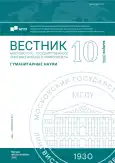Genre Modeling of Institutional Trade Union Discourse
- 作者: Manaeva I.V.1
-
隶属关系:
- Stavropol regional organization of the Education and Science Workers’ Union of Russian Federation, Stavropol
- 期: 编号 10(904) (2025)
- 页面: 55-63
- 栏目: Linguistics
- URL: https://journal-vniispk.ru/2542-2197/article/view/352274
- ID: 352274
如何引用文章
全文:
详细
The purpose of the study is the genre-centric modeling of discursive practices in modern worker’s union interaction on the basis of the integral description of the feature structure and illocutionary spaces of counter-communicants. Six communicative-pragmatic criteria necessary for system-forming genres to meet are determined based on the detailed analysis of the initial illocutions in the triad “agent - client - tertiary agent”, the specifics of the transmission of value-accentuated points of professional consciousness, and current thema-rhematic chains of trade union discourse. The following genres of institutional discourse of trade union work are distinguished: public speech (informative, protocol and persuasive types); negotiations; presentation; slogans / slogans and advertising; mission of the organization and press release.
作者简介
Irina Manaeva
Stavropol regional organization of the Education and Science Workers’ Union of Russian Federation, Stavropol
编辑信件的主要联系方式.
Email: belana189@mail.ru
Information Chief Specialist of the Public Relations Department
俄罗斯联邦参考
- Bredikhin, S. N., Tsybulevskaya, A. V. (2020). Poly- and Inter-discursiveness in Complex Discourse. European Proceedings of Social and Behavioural Sciences EpSBS, 92, 1507–1514.
- Boldyrev, N. N. (2017). Language and the Structure of Mind: the Interpretive Commitment of Cognitive Semantics. In Meaning and Knowledge Representation (pp. 15–17). St.Petersburg: Lexicon.
- Bredikhin, S. N., Bredikhina, Yu. I., Makhova, I. N. (2021). Sposoby intimizatsii kontseptual’no-valernogo prostranstva kontrkommunikantov v institutsional’nom diskurse sotsial’noy raboty = Methods for Intimization of the Concept & Value Space of Counter-Communicants in the Institutional Discourse of Social Work. Nauchnaya mysl’ Kavkaza, 2(106), 119–124. (In Russ.)
- Gorozhanov, A. I., Guseynova, I. A., Pisarik, O. I. (2022). Cyber security model in the E-learning. MCU journal of philology. Theory of linguistics. Linguistic education, 2(46), 119–131. doi: 10.25688/2076-913X.2022.46.2.11. (In Russ.)
- Gorozhanov, A. I., Krasikova, E. A. (2024). Formal model for evaluating the image of a character in a fictional work (based on G. Orwell’s novel “1984”). Philology. Theory & Practice, 17(9), 3239–3248. doi: 10.30853/phil20240458. (In Russ.)
- Gorbunova, N. N., Aldiyeva, M. Sh. (2020). A thesaurus model as a reflection of interdisciplinarity of the terminology system (based on the material of the modern English-language management terminology system). Pyatigorsk State University Bulletin, 2, 142–147. (In Russ.)
- Pisarik, O. I., Gorozhanov, A. I. (2021). Representation of the English-language professional terminology in educational texts for construction specialities students. Philology. Theory & Practice, 14(3), 928–932. doi: 10.30853/phil210082. (In Russ.)
- Linke, A. (2016). Sprache als Praxis. Angemessenheit: Einsichten in Sprachgebräuche. Göttingen: Wallstein Verlag GmbH, 52–66.
- Bakhtin, M. M. (1986). Postanovka problemy i opredelenie rechevykh zhanrov = Problem Statement and Definition of Speech Genres. In Estetika slovesnogo tvorchestva (pp. 237–245). (In Russ.)
- Herring, S. C. (2007). A Faceted Classification Scheme for Computer-Mediated Discourse. Language@Internet, 4, 1.
- Wierzbicka, A. (1992). Semantics, Culture, and Cognition: Universal Human Concepts in Culture-specific Configurations. NY: Oxford University Press.
- Heisler, Т., Vincent, D., Bergeron, A. (2003). Evaluative Metadiscursive Comments and Face-work in Conversational Discourse Text. Journal of Pragmatics, 5, 1613–1631.
- Slyshkin, G. G. (2005). Rechevoy zhanr: perspektivy kontseptologicheskogo analiza = Speech Genre: Prospects for Conceptual Analysis. Zhanry rechi, 4, 34–50. (In Russ.)
- Dementyev, V. V. (2024). K probleme integral’nogo opisaniya rechevykh zhanrov = On the Problem of Integral Description of Speech Genres. Zhanry rechi, 19–1(41), 6–22. (In Russ.)
- Nash, J. (1951). Non-cooperative Games. Annals of Mathematics, 54(2), 286–295.
- Boldyrev, N. N. (2009). Teoreticheskie aspekty yazykovoy kontseptualizatsii. Kontseptual’naya osnova yazyka = Theoretical Aspects of Language Conceptualization. Conceptual Basis of Language. Kontseptualizatsiya mira v yazyke. Moscow: Institute of Linguistics of the Russian Academy of Sciences. (In Russ.)
- Zhilin, D. M. (2010). Teoriya sistem. Opyt postroeniya kursa = Theory of Systems. Course Construction Experience. Moscow: URSS. (In Russ.)
- Bredikhin, S. N. (2023). Teoriya nekooperativnykh igr v porozhdenii i interpretatsii vyskazyvaniy institutsional’nogo diskursa = The Theory of Noncooperative Games in Generation and Interpretation of Utterances in Institutional Discourse. Professional’naya kommunikatsiya: aktual’nye voprosy lingvistiki i metodiki, 16, 50–58. (In Russ.)
- Bredikhin, S. N., Serebryakov, A. A. (2019). The Explicitness of the Deep Structure of Meaning in Prognostic Strategies. The European Proceedings of Social & Behavioural Sciences EpSBS, 58, 2549–2557.
- Kadzhaya, L. A. Kuznetsova, Iu. M., Salimovskii, V. A., Suvorova, M. I. (2021). Tematicheskaya organizatsiya teksta instruktsiy kak lingvisticheskaya osnova priobreteniya znaniy intellektual’nym agentom = Thematic Organization of Instructional Texts as a Linguistic Basis for the Acquisition of Knowledge by an Intelligent Agent. Medialingvistika, 8(1), 45–56. (In Russ.)
- Gray, M. (2023). Entropy and Information Theory. NY: Springer.
补充文件










